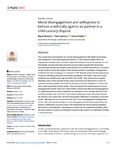Moral disengagement and willingness to behave unethically against ex-partner in a child custody dispute

Use this link to cite
http://hdl.handle.net/2183/38445Collections
- Investigación (FDER) [672]
Metadata
Show full item recordTitle
Moral disengagement and willingness to behave unethically against ex-partner in a child custody disputeDate
2019Citation
Clemente, M., Espinosa, P., & Padilla, D. (2019). Moral disengagement and willingness to be have unethically against ex-partner in a child custody dispute. PLoS ONE, 14(3). https://doi.org/10.1371/JOURNAL.PONE.0213662
Abstract
[Abstract]: The current study examines the role of moral disengagement on the likelihood of making
false allegations or retaliating against the partner in a child custody dispute. Moral disengagement strategies can be useful to explain this tendency to harm their partner in a custody dispute, because they help reduce the aversive state caused by the dissonance
provoked when the ethical principles of the individual do not match their behavior. An individual that is able to lessen the negative affect anticipated before committing a transgression,
would be more likely to engage in it. A sample of 1097 Spanish adults who had experienced
a break up with their partner and had children participated in the study. They were evenly
divided by sex and their mean age was 39.95 (SD = 8.89). They answered to a vignette
depicting a child custody dispute during a break up process and answered to a series of
questions regarding whether they would be willing to make false allegations or to take retaliatory action against their former partner. They also answered to questionnaires on moral
disengagement and the “dark triad” of personality. Results show that moral disengagement
is a significant predictor of false allegations and retaliatory action, stronger than any of the
variables included in the “dark triad”, and predicts willingness to harm the partner beyond
the common core of dark traits. We did not find gender differences in inclination to harm the
partner, although men are more prone to the use of moral disengagement strategies than
women. Still, we found that the type of moral disengagement that better predicts these tendencies is different for men and women. Men significantly favored reconstrual strategies
that include moral justification, advantageous comparison and euphemistic labelling, while
the best predictor for women are strategies focused on the recipient, like attribution of blame
or dehumanization.
Editor version
Rights
Atribución 4.0 Internacional
ISSN
1932-6203






